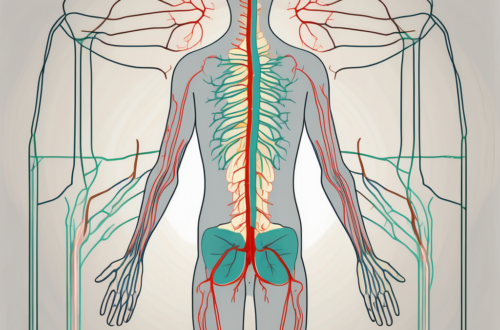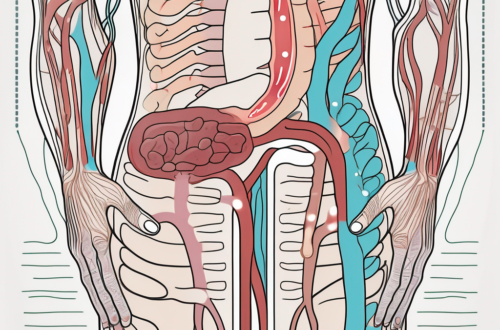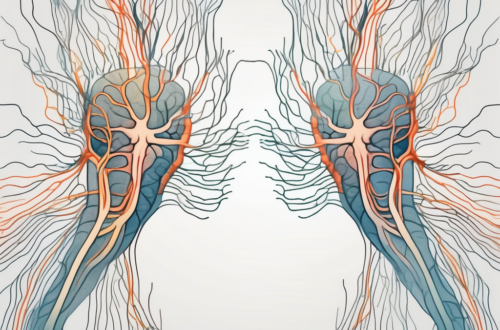Our parasympathetic nervous system plays a crucial role in maintaining our overall well-being and promoting a sense of calm and relaxation. In today’s fast-paced and stressful world, it’s essential to prioritize activities and practices that can help support and soothe our parasympathetic nervous system. In this article, we will delve into the understanding of the parasympathetic nervous system and explore various techniques, including deep breathing exercises, progressive muscle relaxation, mindfulness and meditation, nutrition, physical activity, sleep, and hydration, that can contribute to its calmness. Please note that while these techniques have been known to be helpful for many individuals, it’s always wise to consult with a healthcare professional or doctor for personalized advice.
Understanding the Parasympathetic Nervous System
To effectively calm our parasympathetic nervous system, it’s important to have a basic understanding of its role in our body. The parasympathetic nervous system is the branch of our autonomic nervous system that helps regulate our body’s rest-and-digest response. Its primary function is to conserve energy, slow down our heart rate, promote digestion, and support restorative processes such as tissue repair and growth.
When we activate the parasympathetic nervous system, it triggers a cascade of physiological responses that promote relaxation and rejuvenation. One of the key ways it accomplishes this is by stimulating the release of acetylcholine, a neurotransmitter that helps slow down our heart rate and dilate blood vessels, allowing for increased blood flow to our organs and muscles.
Additionally, the parasympathetic nervous system plays a vital role in supporting our digestive system. When activated, it increases the production of digestive enzymes and stimulates the contraction of smooth muscles in our gastrointestinal tract, facilitating the breakdown and absorption of nutrients from the food we consume.
The Role of the Parasympathetic Nervous System
The parasympathetic nervous system counterbalances the sympathetic nervous system, which is responsible for our body’s fight-or-flight response. While the sympathetic nervous system prepares us for action and survival in times of perceived threat or danger, the parasympathetic nervous system helps restore a sense of calm and equilibrium once the threat has passed.
When the parasympathetic nervous system is activated, it promotes a state of relaxation and rest. Our heart rate decreases, blood pressure lowers, and our breathing becomes slower and deeper. This allows our body to conserve energy and redirect it towards essential functions like digestion, tissue repair, and immune system maintenance.
Furthermore, the parasympathetic nervous system influences our mental and emotional well-being. Its activation helps reduce anxiety, stress, and tension, allowing us to experience a greater sense of peace and tranquility. It also enhances our cognitive function, improving our ability to focus, concentrate, and engage in creative thinking.
The Impact of Stress on the Parasympathetic Nervous System
However, chronic stress, anxiety, and lifestyle factors such as a sedentary lifestyle and poor sleep quality can disrupt the balance of our parasympathetic nervous system, leading to dysregulation and an increased risk of health issues. When we are constantly exposed to stressors, our sympathetic nervous system remains in a heightened state of activation, inhibiting the parasympathetic response.
This prolonged imbalance can have detrimental effects on our physical and mental well-being. It can contribute to the development of conditions such as hypertension, digestive disorders, weakened immune function, and mood disorders like depression and anxiety.
Therefore, it’s crucial to take proactive steps to support the functioning of our parasympathetic nervous system and maintain overall well-being. Engaging in stress-reducing activities such as meditation, deep breathing exercises, and regular physical exercise can help activate the parasympathetic response and promote relaxation. Additionally, adopting a healthy lifestyle that includes a balanced diet, quality sleep, and positive social connections can further support the optimal functioning of our parasympathetic nervous system.
Techniques to Calm the Parasympathetic Nervous System
Thankfully, there are several effective techniques that can help calm our parasympathetic nervous system and promote a sense of relaxation. Let’s explore some of these techniques:
The parasympathetic nervous system is responsible for regulating our body’s rest and digest response. When activated, it helps us relax, slows down our heart rate, and promotes digestion. However, in today’s fast-paced world, our parasympathetic nervous system can often be overwhelmed by stress and anxiety. That’s why it’s important to incorporate techniques that can help us activate and strengthen this vital system.
Deep Breathing Exercises
Deep breathing exercises are simple yet powerful techniques that can help activate the parasympathetic nervous system and elicit a relaxation response in our body. By taking slow, deep breaths and focusing on the sensation of the breath entering and leaving our body, we can shift from a state of stress to a state of calm.
When we engage in deep breathing, we send signals to our brain that everything is okay, triggering the parasympathetic nervous system to take over. As we inhale deeply, our diaphragm contracts, allowing more oxygen to enter our lungs. This oxygen-rich air then travels to our brain, signaling it to release neurotransmitters that promote relaxation and reduce stress.
Progressive Muscle Relaxation
Progressive muscle relaxation involves systematically tensing and relaxing different muscle groups in our body. This technique helps promote awareness of muscle tension and encourages us to let go of physical and mental stress. By incorporating progressive muscle relaxation into our daily routine, we can actively reduce muscle tension and create a sense of deep relaxation.
During progressive muscle relaxation, we start by tensing a specific muscle group, such as our shoulders, for a few seconds. Then, we release the tension and focus on the sensation of relaxation in that area. We repeat this process with different muscle groups, gradually moving from our head to our toes. By consciously tensing and releasing our muscles, we can train our body to recognize the difference between tension and relaxation, ultimately helping us achieve a state of calm.
Mindfulness and Meditation
Mindfulness and meditation practices have gained significant popularity in recent years, and for good reason. These practices involve paying attention to the present moment, cultivating a nonjudgmental attitude, and fostering an accepting mindset. By engaging in regular mindfulness and meditation sessions, we can enhance our ability to manage stress, regulate our emotions, and cultivate a peaceful state of mind.
During mindfulness and meditation, we focus our attention on our breath, bodily sensations, or a specific object. Whenever our mind wanders, which is natural, we gently bring our attention back to the present moment. This process helps us develop a greater sense of self-awareness and allows us to observe our thoughts and emotions without judgment.
Nutrition and the Parasympathetic Nervous System
Our dietary choices play a crucial role in supporting the health of our parasympathetic nervous system. Including essential nutrients in our diet can help nourish our nerves and promote a calm and balanced state. Foods rich in omega-3 fatty acids, magnesium, B vitamins, and antioxidants are known to have a positive impact on our nervous system health.
Omega-3 fatty acids, found in fatty fish like salmon, mackerel, and sardines, as well as plant-based sources like flaxseeds and chia seeds, are essential for maintaining the integrity of our nerve cells. These healthy fats help reduce inflammation in the nervous system and support optimal functioning.
Magnesium, often referred to as the “relaxation mineral,” is involved in over 300 biochemical reactions in our body, including those that regulate our nervous system. Dark leafy greens like spinach and kale, nuts and seeds like almonds and pumpkin seeds, and whole grains like quinoa and brown rice are excellent sources of magnesium.
B vitamins, such as B6, B12, and folate, are vital for nerve health and function. Whole grains, legumes, leafy greens, and animal products like eggs and dairy are rich in these essential vitamins.
Lastly, antioxidants help protect our nerve cells from oxidative stress, which can damage the nervous system. Berries, green tea, and dark chocolate are all delicious sources of antioxidants that can support our parasympathetic nervous system.
Foods to Avoid for a Calm Nervous System
It’s also important to be mindful of certain foods that may negatively impact our parasympathetic nervous system. Foods high in refined sugars, caffeine, and artificial additives can potentially disrupt its functioning and contribute to feelings of anxiety and restlessness. Limiting the consumption of these foods can be beneficial for maintaining a calm and balanced nervous system.
Refined sugars, found in sugary snacks, desserts, and sweetened beverages, can cause blood sugar spikes and crashes, leading to fluctuations in energy levels and mood. Caffeine, found in coffee, tea, and many energy drinks, is a stimulant that can increase heart rate and promote feelings of alertness, which may interfere with the relaxation response of the parasympathetic nervous system.
Artificial additives, such as artificial sweeteners, preservatives, and food colorings, are often found in processed foods. These additives can potentially trigger allergic reactions or sensitivities in some individuals, leading to symptoms like anxiety and restlessness.
By being mindful of our dietary choices and incorporating techniques like deep breathing, progressive muscle relaxation, and mindfulness into our daily routine, we can actively support and strengthen our parasympathetic nervous system. Remember, a calm and balanced nervous system is essential for overall well-being and optimal health.
Physical Activity and the Parasympathetic Nervous System
Engaging in regular physical activity is not only important for our physical health but also has a significant impact on our nervous system. Exercise helps release endorphins, the “feel-good” hormones, and reduces the levels of stress hormones in our body. This in turn promotes a sense of well-being and supports the overall health of our parasympathetic nervous system.
When we engage in activities such as walking, jogging, swimming, or yoga, we not only strengthen our muscles and improve our cardiovascular health, but we also stimulate the parasympathetic nervous system. This branch of the autonomic nervous system is responsible for promoting rest, relaxation, and digestion. By incorporating these activities into our daily routine, we can foster a healthy balance in our nervous system and enhance our overall well-being.
The Benefits of Regular Exercise
Regular exercise has been shown to improve sleep quality, enhance mood, increase energy levels, and reduce symptoms of anxiety and depression. When we engage in physical activity, our body releases endorphins, which are natural chemicals that act as painkillers and mood elevators. These endorphins not only make us feel good during and after exercise but also help alleviate symptoms of stress and anxiety.
Furthermore, exercise helps regulate the levels of stress hormones in our body, such as cortisol. High levels of cortisol can contribute to feelings of anxiety and can negatively impact our overall health. By engaging in regular physical activity, we can effectively reduce the levels of cortisol in our body, promoting a sense of calm and relaxation.
Yoga and Tai Chi for Nervous System Health
Yoga and Tai Chi are mind-body practices that have been revered for their ability to calm the mind and promote physical relaxation. These practices incorporate gentle movements, breath control, and mindfulness, allowing us to connect with our body and mind on a deeper level.
Practicing yoga or Tai Chi regularly can help reduce stress, promote relaxation, and support the balance of our parasympathetic nervous system. These practices emphasize slow, controlled movements and deep breathing, which activate the parasympathetic nervous system and induce a state of relaxation. Additionally, the mindfulness aspect of these practices helps us become more aware of our body and its sensations, allowing us to better manage stress and promote overall well-being.
Yoga and Tai Chi also offer the added benefit of improving flexibility, strength, and balance. As we age, these physical attributes become increasingly important for maintaining independence and preventing injuries. By incorporating these mind-body practices into our routine, we not only support the health of our parasympathetic nervous system but also enhance our overall physical fitness.
Sleep and the Parasympathetic Nervous System
Quality sleep is vital for the optimal functioning of both our body and mind. During sleep, our parasympathetic nervous system takes the lead, promoting restorative processes and allowing our body to repair and recharge.
When we sleep, our parasympathetic nervous system becomes more active, while the sympathetic nervous system, responsible for our fight-or-flight response, takes a backseat. This shift in dominance allows our body to focus on essential functions such as digestion, immune system regulation, and tissue repair.
During sleep, our brain also goes through various stages, including rapid eye movement (REM) sleep and non-rapid eye movement (NREM) sleep. These stages play a crucial role in memory consolidation, learning, and emotional regulation. NREM sleep is further divided into three stages, each with its unique characteristics and benefits.
The Importance of Quality Sleep
Adequate sleep quantity and quality are essential for a calm and well-functioning parasympathetic nervous system. When we consistently get enough sleep, our body can efficiently carry out the restorative processes necessary for maintaining physical and mental health.
During deep sleep, our brain produces growth hormone, which helps repair tissues, build muscle, and strengthen our immune system. Additionally, sleep plays a vital role in regulating our metabolism, appetite, and hormone levels, contributing to overall well-being.
Poor sleep quality or insufficient sleep can have detrimental effects on our parasympathetic nervous system. It can lead to increased stress levels, impaired cognitive function, weakened immune system, and heightened risk of chronic conditions such as obesity, diabetes, and cardiovascular disease.
Sleep Hygiene Tips for a Calm Nervous System
Practicing good sleep hygiene involves adopting habits that promote healthy sleep patterns. By incorporating these habits into our daily routine, we can support the functioning of our parasympathetic nervous system and improve the quality of our sleep.
Avoiding stimulating activities before bed is crucial for preparing our mind and body for sleep. Engaging in activities such as reading a book, taking a warm bath, or listening to calming music can help promote relaxation and signal to our brain that it’s time to wind down.
Creating a comfortable sleep environment is also essential. This includes keeping the bedroom cool, dark, and quiet. Investing in a supportive mattress and pillows, as well as using breathable bedding materials, can enhance our comfort and promote uninterrupted sleep.
Limiting exposure to electronic devices, especially in the hour leading up to bedtime, is crucial for reducing the impact of blue light on our sleep-wake cycle. Blue light emitted by screens can suppress the production of melatonin, a hormone that regulates sleep. Instead, engaging in relaxing activities such as gentle stretching, deep breathing exercises, or meditation can help prepare our mind and body for sleep.
Incorporating these sleep hygiene tips into our daily routine can contribute to better sleep quality, allowing our parasympathetic nervous system to function optimally. By prioritizing sleep and creating a sleep-friendly environment, we can support our overall well-being and promote a calm nervous system.
The Role of Hydration in Nervous System Health
Staying adequately hydrated is crucial for the optimal functioning of our parasympathetic nervous system. Water is essential for carrying nutrients and oxygen to our cells, facilitating the processes that promote relaxation and overall well-being.
How Dehydration Affects the Nervous System
Dehydration can negatively impact our nervous system by reducing blood flow to the brain and affecting the balance of electrolytes necessary for optimal nerve function. Even mild dehydration can result in mood changes, poor concentration, and increased feelings of stress.
Tips for Staying Hydrated
To support the health of our parasympathetic nervous system, it’s important to stay hydrated throughout the day. Aim to drink an adequate amount of water daily, and incorporate hydrating foods such as fruits and vegetables into your diet. Pay attention to your body’s signals of thirst, and be proactive in maintaining optimal hydration levels.
Conclusion: Maintaining a Balanced Parasympathetic Nervous System
Prioritizing activities and practices that support our parasympathetic nervous system is crucial for promoting a sense of calm and overall well-being. From deep breathing exercises and progressive muscle relaxation to mindfulness, nutrition, physical activity, sleep, and hydration, there are numerous strategies that can contribute to the calmness and balance of our nervous system.
While these techniques have shown promise for many individuals, it’s important to remember that everyone’s needs and experiences may vary. If you have any concerns or pre-existing health conditions, it’s advisable to consult with a healthcare professional or doctor for personalized recommendations.
By incorporating these practices into our daily routine and adopting a holistic approach to our well-being, we can nurture and support our parasympathetic nervous system, ultimately cultivating a greater sense of calm, resilience, and overall health.





